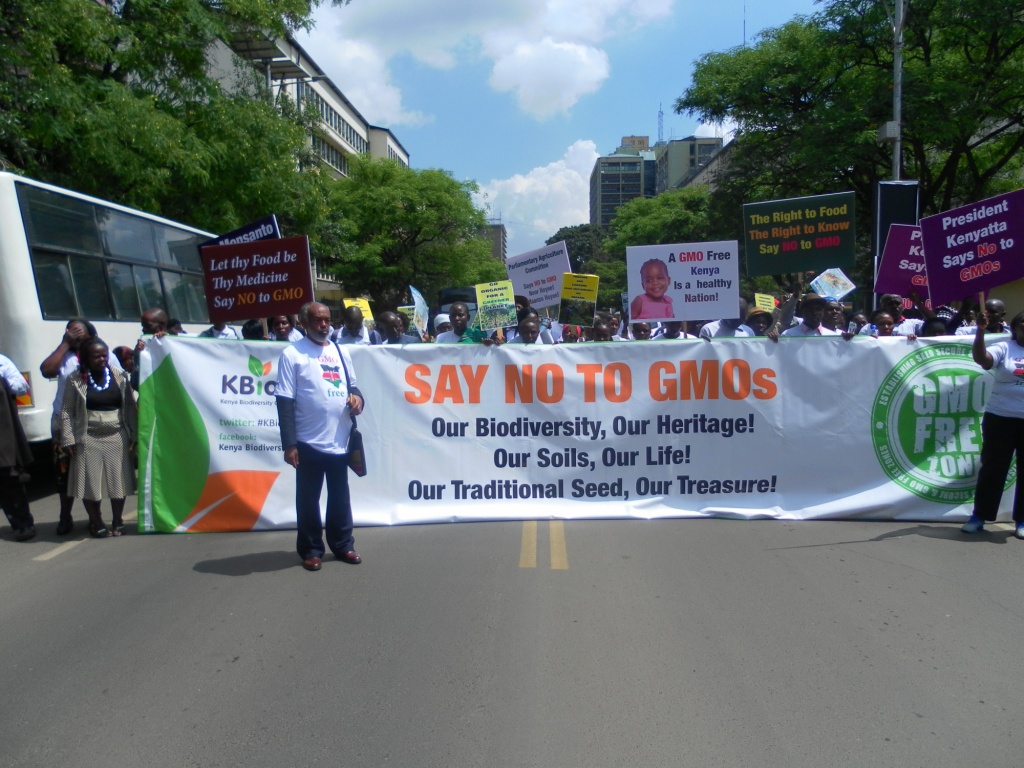
By Evelyne Nafula
Kenyan farmers have called upon the government to help them protect traditional seeds that they say are inching closer to extinction.
The farmers, drawn from twenty counties, decried exploitation by Multinational seed companies whom they accuse of introducing through dubious means genetically engineered seeds that continue to threaten health and food security.
Adoption of what they termed as ‘false technologies’ too have seen them endure vicious cycles of poverty and decreased income from their produce.
Farmers say initially they used to get seeds from local seed companies like Kenya Seed and the seed was being produced locally.
Kenya Biodiversity Coalition (KBioC) raised an alarm over threats by multinationals that are bringing in genetically engineered seeds.
Poor seed quality, coupled with runaway extortion from middlemen have made farmers incur massive losses without getting any compensation.
Mrs Hellen Ngema, food security and climate change risk specialist revealed that Kenyan farmers have failed to get good yields because of poor quality seeds.
“During the last planting and harvesting season I was able to visit different farmers on their farms and what I learned was poor harvest. Also some crops were affected by pests and diseases” said Mrs Ngema who is also a member of (KBioC).
Producing crops and raring of animals on their natural environment, the climate change expert revealed, is a suitable pathway to food systems that produce more with less environmental cost.

Ngema added that planting of crops and raring of animals in environment (ecosystem) they are not suitable is big challenge facing farmers across the country.
“Why don’t we choose crops which are suitable in their natural habitat to minimize use of chemicals that has since threatened human health and spoiled our soil.” Said Mrs Ngema.
She revealed that by practicing so farmers can afford to harvest more yields instead of buying expensive pesticides to help control crops in ecosystems where they don’t suit.
Soil fertility maintenance, Farm mechanization, selective breeding and introduction of GMOs crops have poor yields, small holder farmers have nothing to celebrate.
“The seeds bought from shops are expensive. But after planting the maize it grows to a certain height, tassels but produce nothing” noted Mrs Ngema.
Practicing farming on the right ecosystem is the best way to improve resources and get knowledge on how to trade and enhance food sovereignty.
Kenya has a better position to learn and embrace agro-ecology than to accept failed technologies and inherit problems that take too long and expensive to solve.
“Our decision to ban GMOs is indisputable since developed countries are equipped with infrastructure like expensive testing kits and capacities which we do not have .” said Mrs Ngema.
A Kenyan delegation to Burkina Faso discovered that Burkina be farmers rejected growing Bt Cotton because of depressed yields, a contradiction of scientists’ reports.
“During the World Diabetes day which was celebrated in November 2016, showed decline in diabetic cases in developed countries and an increase in developing countries. This is life threatening considering inadequate health infrastructures .” Explained Mrs Ngema.
She said there are many benefits which result from practicing farming on the right ecosystem adding that it will help address climate change.
Another benefit Ngema says is provision on employment and good income.
“Farmers grain yields are doubled, with increased biodiversity and soil fertility. For example in Tigray, Ethiopia, farmers produced 25% more rice than conventional farmers in Senegal. 50,000 farmers practicing agro-ecology increased maize yields to 3–4 metric tons per hectare in southern Africa.” revealed Ngema.
Mrs Ngema said increasing in agricultural biodiversity is also another benefit farmer adapt to changes in heat, drought, pests and low soil fertility with over 30% more species on a farm.
“Small-scale farmers get access to fair credit and improve market access” she concluded.
Farmers have been holding series of demonstration in the country to push the government keep the ban on GM crops/food on. They want the government to give more time for proper research to be carried out on GM crops before considering lifting the ban.













